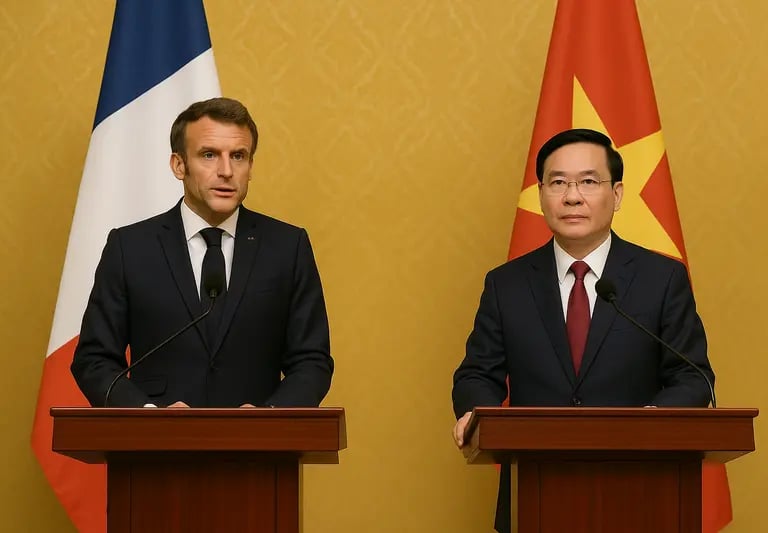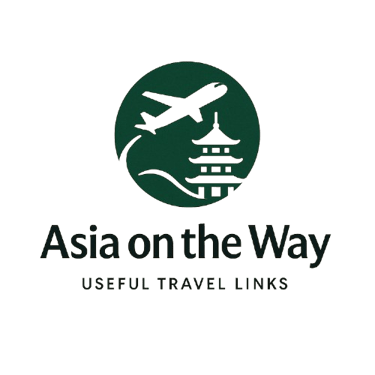Visit of Emmanuel Macron to Vietnam: Agreements, Shared History, and the Future of Franco-Vietnamese Relations
Discover the key takeaways from President Emmanuel Macron's official visit to Vietnam, May 25–27, 2025: strategic agreements, the historical evolution of bilateral ties, the Vietnamese language’s journey, and academic exchange opportunities.
BLOG VIETNAM
5/29/20255 min read


Emmanuel Macron’s State Visit to Vietnam in 2025
Strengthening Bilateral and Multilateral Cooperation in a Shifting Global Order
From May 25 to 27, 2025, French President Emmanuel Macron conducted a landmark state visit to Vietnam, a strategic moment in international relations between two nations deeply connected by history, culture, and shared global ambitions.
This visit is more than symbolic: it reflects a modern diplomacy grounded in cooperation, development goals, and sustainable, reciprocal partnerships.
Organized by the Ministry of Foreign Affairs of the French Republic in partnership with its Vietnamese counterpart, the visit featured high-level ministerial meetings, treaty negotiations, and the signing of a wide range of bilateral and multilateral agreements.
Key sectors included defense, global health, aeronautics, education, culture, energy, and international development.
This diplomatic initiative illustrates how member-states of the European Union, ASEAN, and global bodies like the UNDP, the OECD, and the Security Council work to promote peace, prosperity, and solidarity in the Indo-Pacific.
Diplomatic Milestones: A Timeline of France-Vietnam Cooperation
The ambassadors and senior delegations held a series of consultations in Hanoi aimed at expanding ties across the public and private sector. These discussions resulted in:
1. Aeronautics
VietJet signed a deal to purchase 20 Airbus A330-900neo aircraft, raising its total Airbus fleet to 40. The deal, valued at over $3 billion, reinforces air connectivity between Southeast Asia and Europe, promoting economic prosperity and job creation.
2. Global Health & Pharmaceutical Sovereignty
French pharmaceutical giant Sanofi agreed to develop local vaccine production facilities in Vietnam to enhance global health resilience and capacity building.
The initiative aligns with Sustainable Development Goals (SDGs) and international standards set by UN agencies.
3. Defense & Security Cooperation
Vietnam and France reaffirmed their mutual commitment to peacekeeping operations, anti-terrorism initiatives, and military training programs. This co-operation includes exchanges between naval forces and enhanced ministerial-level dialogue.
4. Education, Culture, and Francophonie
The two governments expanded Erasmus+ agreements, launched new joint degree programs, and pledged to strengthen French-language education.
Cultural exchanges, parliamentary diplomacy, and university-level collaborations will now operate under a reinforced framework of cooperation.
5. Energy and Environment
Both countries signed memoranda focused on civil nuclear energy, sustainable urban development, and climate diplomacy.
France reaffirmed its solidarity with Vietnam in climate adaptation and ecological transition efforts.
The United States and Vietnam: A Parallel Diplomatic Arc
While France and Vietnam deepen ties, Vietnam’s bilateral relationship with the United States is also flourishing. Since the normalization of relations, the two countries have emphasized:
Strategic dialogues on free trade, migration, and regional security
High-level meetings involving the Secretary-General, Prime Minister, and delegations from both sides
Joint projects in digital economy, humanitarian aid, and civil aviation
This triangular relationship (France–Vietnam–USA) signals a broader geopolitical shift toward multilateral cooperation in the Indo-Pacific.
Vietnam, Tunisia, and the South: Expanding the Diplomatic Web
Vietnam also continues to strengthen ties with nations in Africa and the Middle East, including Tunisia and Morocco. These relations of cooperation are often anchored in:
South-South exchanges
Jumelages (city partnerships)
Programs funded by AFD and coordinated via the Direction of Cooperation within France’s Ministry of Foreign Affairs
Countries like Tunisia have engaged in conferences on education, migration, and sustainable development, reflecting Vietnam’s growing role as a global diplomatic player.
France’s Global Strategy: Diplomacy in Action
France continues to invest heavily in international development through call for projects, seminars, and ministerial conferences. The nation’s policy of cooperation is structured around:
International organizations like the OECD, UNDP, and OIF
Treaties and agreements supporting innovation, entrepreneurship, and public health
Promotion of prosperity, academic freedom, and sustainable governance through consultations and regional platforms
This strategy is designed to reinforce not just bilateral relations, but also relations multilatérales, anchored in reciprocity, inclusion, and long-term vision.
Conclusion
President Macron’s 2025 visit to Vietnam represents a diplomatic blueprint for 21st-century cooperation. Through expanded international conferences, treaty negotiations, and shared commitments to climate, health, and education, both nations position themselves as key actors in the global balance of power.
Their collaborations with the private sector, civil society, and international institutions show that diplomacy is not merely a function of politics—it’s an evolving partnership in pursuit of shared goals.
🌏 FAQ – International Relations & Macron’s Visit to Vietnam (2025)
What were the key agreements signed during Macron’s visit to Vietnam?
Airbus A330-900neo purchase (20 aircraft), global health agreement with Sanofi, defense and anti-terrorism cooperation, Erasmus+ expansion, and nuclear energy & climate resilience projects.
What is bilateral cooperation?
Agreements and actions between two nations — in this case, France and Vietnam — spanning education, economy, defense, and diplomacy.
What is multilateral cooperation?
Collaboration between multiple countries or organizations on shared issues, such as health, migration, and climate, within frameworks like ASEAN, UN, or OECD.
What is the role of the Ministry of Foreign Affairs?
It manages foreign policy, oversees relations, represents the state in negotiations, and coordinates development aid.
What are Sustainable Development Goals (SDGs)?
A UN agenda aiming to end poverty, ensure health and education, and fight climate change by 2030.
What does “call for projects” mean in international cooperation?
Funding or partnership opportunities open to NGOs, universities, and institutions aligned with diplomatic or development objectives.
How does France support global health?
Through the AFD, global health funds, and public-private partnerships that strengthen healthcare systems and promote vaccine equity.
What is the value of parliamentary and ministerial consultations?
They build trust, align policy goals, and help prepare legal and diplomatic frameworks for treaties and investments.
How do international organizations promote prosperity?
By coordinating investments, sharing expertise, and supporting reforms in emerging economies.
What is ASEAN’s role in all this?
It anchors Vietnam’s regional diplomacy, peace, and trade initiatives, often with EU support.
🌐 Extended FAQ – France–Vietnam Cooperation
What role does the United Nations play in Franco-Vietnamese cooperation?
UN agencies like UNDP support peace, gender equality, and inclusive development, with France and Vietnam collaborating on law and security.
How is the Ministry of Foreign Affairs involved in development?
It leads high-level diplomacy, manages embassies, and represents national interests in Asia-Pacific frameworks.
What is the Belt and Road Initiative and how does it relate to Vietnam?
A Chinese-led infrastructure plan; Vietnam engages selectively while diversifying partnerships with France, the EU, and others.
How do embassies and consular services support cooperation?
They facilitate trade, issue visas, and promote cultural and scientific exchange.
What is the role of international law in France–Vietnam agreements?
It ensures treaties align with UN standards, gender equality, and environmental responsibility.
What are the goals of UNDP in Vietnam?
Focus areas include climate action, digital transformation, and inclusive governance, supported by France.
How does the French embassy in Vietnam engage with local authorities?
Through trade, education, energy, and cultural projects, plus conferences on innovation and climate.
What types of international conferences took place during Macron’s visit?
Forums on trade, academia, gender equality, and refugee policy.
How do France and Vietnam promote gender equality in diplomacy?
Via UNDP, World Bank, and embassy programs, including leadership seminars.
What is the significance of delegation exchanges?
They strengthen trust and expand cooperation in security, science, and visas.
How is Vietnam engaging with other countries while cooperating with France?
It maintains active ties with the U.S., China, Japan, and European nations.
What is the role of the World Bank in Vietnam’s development?
It funds clean energy, healthcare, and infrastructure, often with French support.
What issues does the Security Council focus on regarding Vietnam?
The South China Sea, maritime sovereignty, and regional peace.
What is the diplomatic status of territories and consular zones?
Both nations respect sovereignty and support dual-nationals via consular agreements.
Why are international treaties essential?
They formalize cooperation in trade, energy, culture, and security under global legal standards.
Travel
Asia Blog – Practical tips about Vietnam, Thailand, South Korea, Cambodia... visas, eSIMs, banking, travel budget, and more.
© 2025. All rights reserved.
